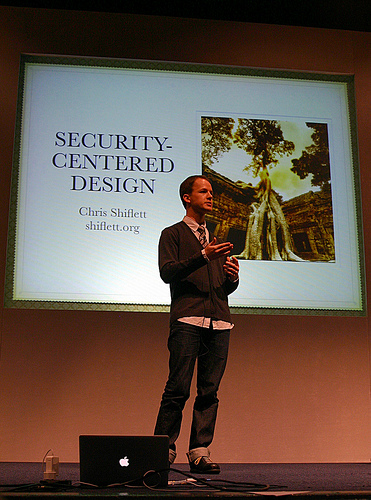The conference day. We woke up early to get in queue at registration which opened at 08:30. When we got to the Olympia Conference Center, which was about 5 minutes walk from our hotel, it was full of people. More than a hundred people already, and we were early. Got our badges and notepads, grabbed a coffee, and started wondering around. There were a few sponsor stands, so we had something to do.
Honestly, I thought there would be more stands, and from companies which are closer related to web development. We got to O’Reilly to buy some books at 35% discount (I was the first customer of the day, beta-testing the receipt issuing procedure, hehe). Looked at iBuildings stand briefly. Looked at Sun MySQL something to do with reporting tool something. It was crowded over there and I had a cup of coffee in my hands, so didn’t get too close. Saw a few people playing with Wii and some more with MS Xbox 360. Seemed like fun.
The conference itself featured a few talks, and it was a double track, so each attndee had to chose from one of the two concurrent speeches which to attend. Here are the ones that I went to:
- Keynote talk: The future’s so bright, I gotta wear shades by Aral Balkan. It was a bit too lengthy for the points it made, but inspiration non-the-less.
- Sharding Architectures by David Soria Parra. Very interesting discussion on scaling database across several servers. Sharding technique described can be applied to much more than just that.
- Of Lambda Functions, Closures and Traits by Sebastian Bergmann. A look into some advanced features of PHP 5.3. These will make writing PHP code a bit more fun, and result a bit more pleasant to look at.
- Living with Frameworks by Stuart Herbert. Nice, balanced look at why frameworks are important. It was a bit misplaced though, since it was more for people who don’t yet use frameworks, while most of the audience was from the frameworks camp.
- Myphp-busters: symfony framework by Stefan Koopmanschap. An overview of Symfony framework, which made me love CakePHP even more.
- Security-Centered Design — exploring the impact of human behavior by Chris Shiflett. Interesting descussion (with cool examples) of social part in security approaches.
Sharding Architectures and Lambda Functions were two of my favourite talks for technical insight. Security-Centered Design and Living with Frameworks were the two favourites for non-technical inspiration.
After the last talk there were a few free beers at the venue, and after that there was another beer session at Brook Green Hotel. Quite a few people, quite a few pints, quite a few interesting conversations and contacts made, excellent buffett, and overall a time well spent.
A note to conference organizers: I know you guys worked hard to make this happen, and that you are a bunch of hobbyiests who are not getting paid to do this, so, first of all, thank you. I really enjoyed the event. Here are a few things that I think could be improved, just in case you will have control over them the next time:
- WiFi coverage. Yes, it was there and it was sort of working, but it was also slow and unstable. At the beginning I thought that was just me for some reason, but then heard a few more people complain.
- Power sockets. I remember seeing only 3. Maybe I just didn’t find them, of course, but they are sort of important.
- Beer is the ultimate conversation maker. Have it nearby from lunch on and more magic would happen. (It doesn’t have to be free)
- Mechandize. Stickers, t-shirts, badges, etc to help remember and promote the event.
- More stands. I wanted to see people who do hosting, consulting, trainging, build tools, and more of the related.
As I said, I had an excellent time, learned a few new things, got inspired, met interesting people, etc. An event was definitely a success and I’d gladly attend the future ones as well. Oh, and I made a few pictures, which are available in my PHP UK Conference 2009 Flickr set.
